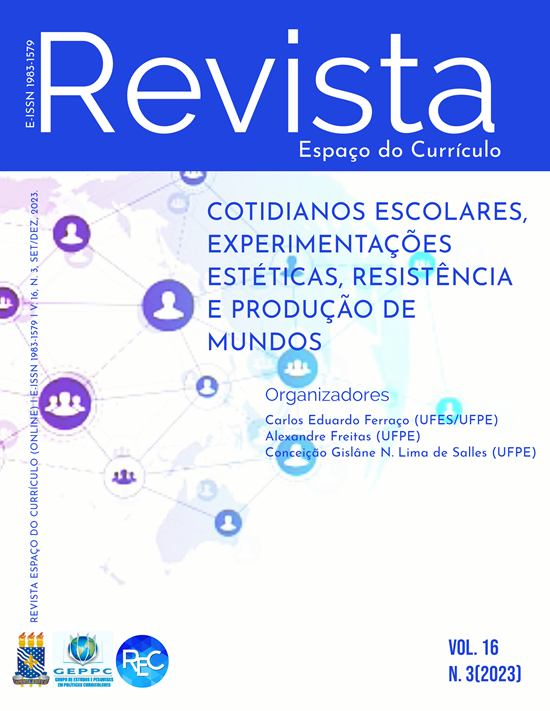THE INVENTION OF SCHIZOANALYSIS BY GILLES DELEUZE AND FÉLIX GUATTARI AND SOME PROBLEMATIZATIONS FOR EDUCATION
DOI:
https://doi.org/10.15687/rec.v16i3.68493Keywords:
Schizoanalysis, Experimentation, EducationAbstract
This text proposes to examine the invention of schizoanalysis, by Gilles Deleuze and Felix Guattari and some contributions to Education. To this end, discusses the concepts of desiring machines and Body Without Organs, present in the book The Anti Oedipus. The concept of machine is used to evidence the machinery and does not refer to the non-human, technological, but to the production, to the gears that sustain reality. Desiring machines are associated with the concept of Body without Organs, corporeality that does not belong to a subject, but is crossed by an intensive and connective vitality. This thought sustains the complexity and processuality of reality moving from the domain of representation to the domain of experimentation. It also changes the way of approaching subjectivity, not in its interiority, but from the relationships that are established and their effects. At the end of the article, a discussion is developed regarding Education and how schizoanalysis can be a way of thinking about invention and resistance in different learning processes.
Downloads
Metrics
References
ANDOKA, Florence. Machine désirante et subjectivité dans l’Anti-Œdipe de Deleuze et Guattari. Philosophique, 15, 85-94, 2012. DOI: 10.4000/philosophique.659 DOI: https://doi.org/10.4000/philosophique.659
ANDOKA, Florence. Qu´est-ce qu´un corps sans organes? Philosophique, 16, 85-94, 2013. DOI: 10.4000/philosophique.838 DOI: https://doi.org/10.4000/philosophique.838
ARTAUD, Antonin. Para acabar com o juízo de Deus. 1947 Recuperado de http://www.questaodecritica.com.br/2010/03/a-nocao-de-corpo-sem-orgaos-em-artaud-e-no-teatro-da-crueldade
BARNES, Julian. Altos voos e quedas livres. Rio de Janeiro: Rocco, 2014.
BERGSON, Henry. O pensamento e o movente. São Paulo: Martins Fontes, 2006.
BERGSON, Henry. A evolução criadora. São Paulo: Unesp, 2010.
BOUISSAC, Paul. Saussure: um guia para os perplexos. Petrópolis: Vozes/Brasiliense, 2012.
CARVALHO, Jairo Dias. A imanência, apresentação de um roteiro de estudo sobre Gilles Deleuze. Trans/Form/Ação, 28(1), 119-132, 2005. DOI: 10.1590/S0101-31732005000100007 DOI: https://doi.org/10.1590/S0101-31732005000100007
DELEUZE, Gilles; GUATTARI, Félix. O Anti-Édipo: capitalismo e esquizofrenia. Rio de Janeiro: Ed. 34., 2010.
DELEUZE, Gilles. Anti-Œdipe et Mille Plateaux: cours du 15/02/1972 [Weblog]. Recuperado de https://www.webdeleuze.com/textes/156
DELEUZE, Gilles. O atual e o virtual. In: ALLIEZ, Éric. Deleuze filosofia virtual. Rio de Janeiro: Ed. 34, 1996.
DELEUZE, Gilles. Lógica do sentido. São Paulo: Perspectiva, 1998.
DELEUZE, Gilles. Bergsonismo. São Paulo: Ed. 34, 1999.
DELEUZE, Gilles. Diferença e repetição. Rio de Janeiro: Graal, 2006 a.
DELEUZE, Gilles. A ilha deserta e outros textos. São Paulo: Iluminuras, 2006 b.
DINIS, Nilson Fernandes. A esquizoanálise: um olhar oblíquo sobre corpos, gêneros e sexualidades. Sociedade e Cultura, 11(2), 355-361, 2008. DOI: 10.5216/sec.v11i2.5293. DOI: https://doi.org/10.5216/sec.v11i2.5293
DOSSE, François. Deleuze e Guattari: biografia cruzada. Porto Alegre: Artmed, 2010.
GUATTARI, Félix. Revolução molecular: pulsações políticas do desejo. São Paulo: Brasiliense, 1985.
GUATTARi, Félix. Entrevista. In: GUATTARI, Félix; LAPASSADE, Georges; LOURAU, Rene; MENDEL, Gerard; ARDOINO, Jacques. La intervención institucional. México: Plaza y Valdés, 1987.
GUATTARi, Félix. Caosmose: um novo paradigma estético. Rio de Janeiro: Ed. 34, 1992.
GUATTARi, Félix. The Anti-Oedipus papers. New York: Semiotext(e), 2006.
GUATTARi, Félix. Confrontações. São Paulo: n-1, 2016. DOI: https://doi.org/10.5171/2015.620549
PELBART, Peter Pal. Subjetividade Esquizo. In: PELBART, Peter Pal. A vertigem por um fio: políticas da subjetividade contemporânea. São Paulo, SP: Iluminuras,2000.
ROUDINESCO, Élisabeth. Genealogias. Rio de Janeiro: Relume-Dumará, 1995.
ROUDINESCO, Élisabeth. Jacques Lacan: esboço de uma vida, história de um sistema de pensamento. São Paulo: Companhia das Letras, 2008.
SAUVAGNARGUES, Anne. Un cavalier schizo-analytique sur le plateau du jeu d’échecs politique. Multitudes, 34(3), 22-29, 2008. DOI: 10.3917/mult.034.0030 DOI: https://doi.org/10.3917/mult.034.0030
SILVA, Rafael Bianchi; CARVALHAES, Flávia Fernandes de. Psicologia e políticas públicas: impasses e reinvenções. Psicologia & Sociedade, 28(2), 247-256, 2016. DOI: 10.1590/1807-03102016v28n2p247 DOI: https://doi.org/10.1590/1807-03102016v28n2p247
Downloads
Published
How to Cite
Issue
Section
License
Copyright (c) 2023 Curriculum Space Journal

This work is licensed under a Creative Commons Attribution 4.0 International License.
By submitting an article to Curriculum Space Journal (CSJ) and having it approved, the authors agree to assign, without remuneration, the following rights to Curriculum Space Journal: first publication rights and permission for CSJ to redistribute this article. article and its metadata to the indexing and reference services that its editors deem appropriate.
















